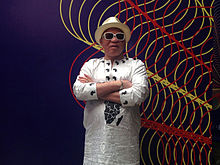Salif Keïta
| Salif Keita | |
|---|---|

Keita in 2015, Festival Internacional Cervantino, Mexico.
|
|
| Background information | |
| Born | August 25, 1949 |
| Origin | Djoliba, Mali |
| Genres | Afro-pop |
| Occupation(s) | Singer |
Salif Keïta (IPA: [salif keɪta]) (born August 25, 1949) is an afro-pop singer-songwriter from Mali. He is notable not only because of his reputation as the "Golden Voice of Africa" but because he has albinism.
Keita was born in the village of Djoliba. He was cast out by his family and ostracized by the community because of his albinism, a sign of bad luck in Mandinka culture. In 1967, he left Djoliba for Bamako, where he joined the government sponsored Super Rail Band de Bamako. In 1973 Keita joined the group, Les Ambassadeurs. Keita and Les Ambassadeurs fled political unrest in Mali during the mid-1970s for Abidjan, Ivory Coast, and subsequently changed the group's name to "Les Ambassadeurs Internationaux". The reputation of Les Ambassadeurs Internationaux rose to the international level in the 1970s, and in 1977 Keita received a National Order award from the president of Guinea, Sékou Touré.
He is the adoptive father of niece Paralympian athlete Nantenin Keita.
Keita moved to Paris in 1984 to reach a larger audience. His music combines traditional West African music styles with influences from both Europe and the Americas. Musical instruments that are commonly featured in Keita's work include balafons, djembes, guitars, koras, organs, saxophones, and synthesizers. He performed at the Nelson Mandela 70th Birthday Tribute concert in 1988 to call for Nelson Mandela's release from prison. In 1990, Keita contributed "Begin the Beguine" to the Cole Porter tribute/AIDS benefit album Red Hot + Blue, produced by the Red Hot Organization.
...
Wikipedia
